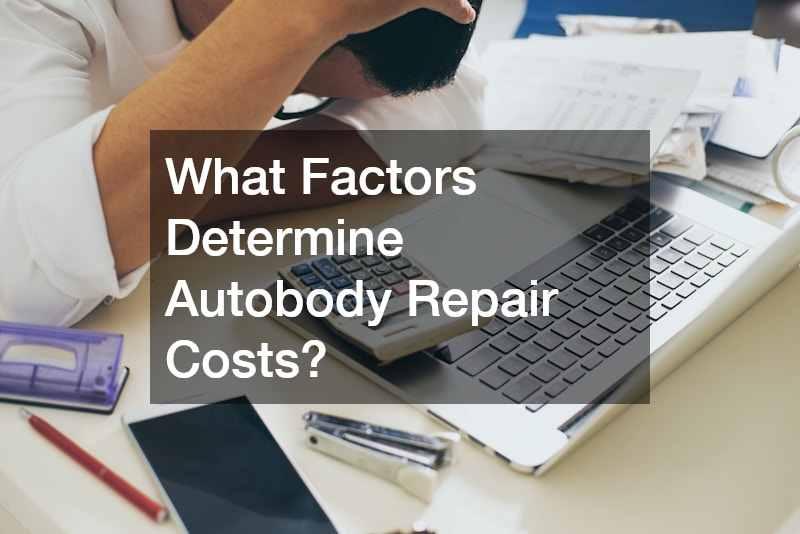Selecting the right autobody business is a critical decision that impacts both the integrity and value of your vehicle. Whether you’ve been involved in an auto accident or need cosmetic repairs like auto dent repair or windshield repair, choosing a trustworthy shop ensures the job is done correctly and safely. The wrong choice could lead to poor workmanship, hidden issues, or even complications with your car insurance claims.
A reputable autobody business not only restores your vehicle’s appearance but also ensures it is safe to drive. These shops should be equipped to handle everything from towing after a collision to coordinating with your insurance provider and even referring you to a personal injury lawyer if needed. In areas where options abound—from a local auto body shop to a larger collision service center—it can be difficult to know where to turn. Some drivers may even start their journey at a tire shop and find themselves needing much more extensive repair services.
In this article, we’ll delve into what defines a reputable autobody business and address the key factors, certifications, costs, and considerations that help vehicle owners make informed choices. With the right guidance, you can navigate the repair process confidently, ensuring your vehicle receives the attention it deserves and retains its performance and resale value.
What Qualities Define a Reputable Autobody Business?

Quality of Workmanship
The foundation of any good body shop lies in its quality of workmanship. This includes precision in repairs, use of OEM or high-quality aftermarket parts, and attention to detail. High standards in this area ensure that your vehicle looks and performs as well as it did before the damage occurred.
Customer Service and Communication
A reliable local auto body shop prioritizes clear and responsive communication. From initial contact to final delivery, customers should feel informed and respected. Staff should be accessible for updates, questions, and clarifications throughout the repair process.
Professional Certifications and Training
Certifications from recognized industry bodies such as I-CAR or ASE are strong indicators of a shop’s commitment to professionalism. These credentials demonstrate that technicians have undergone rigorous training and continue to keep up with evolving standards.
Reputation and Reviews
A strong local reputation, supported by positive online reviews, is often a sign of consistent quality. Word of mouth and digital testimonials offer valuable insight into the experiences of previous customers and the shop’s overall reliability.
Transparency in Estimates and Pricing
Honest and clear pricing practices reflect integrity. Reputable shops provide detailed written estimates that outline labor, parts, and any additional charges. Transparency reduces the likelihood of surprise costs and fosters trust.
How to Verify Autobody Business Certifications?

Identifying Important Certifications
Look for certifications from respected organizations like the Inter-Industry Conference on Auto Collision Repair (I-CAR), the National Institute for Automotive Service Excellence (ASE), and OEM certifications from car manufacturers. These credentials show that the shop meets or exceeds industry standards.
Verifying Through Industry Associations
You can confirm a shop’s certifications by visiting association websites. I-CAR and ASE maintain online directories of certified businesses and technicians. Verifying credentials directly ensures that they are current and valid.
Checking for Insurance and Licenses
In addition to professional certifications, a reputable shop should have valid state licenses and sufficient insurance. These documents demonstrate that the business operates legally and has coverage in case of liability or accidents during the repair process.
Understanding Certification Levels
Certifications often come in tiers, indicating the level of expertise or specialization. For instance, I-CAR’s Gold Class status signifies that a shop has met extensive training requirements across multiple repair areas.
Impact of Certifications on Quality
Certified technicians are more likely to follow best practices, use correct repair techniques, and be familiar with the latest vehicle technologies. This directly influences the quality, safety, and longevity of repairs.
Why is Experience Important in the Autobody Industry?
Depth of Knowledge and Skills
Experienced technicians have a deeper understanding of complex repairs and are adept at identifying hidden damage. Their knowledge results in more accurate diagnoses and effective solutions, especially following an auto accident where structural integrity may be compromised.
Handling Diverse Vehicle Models
A shop with a long history is likely to have worked on a wide range of vehicles, including foreign and domestic brands. This diversity enhances their capability to address unique repair needs, from auto dent repair to complex collision service.
Adaptability to New Technologies
The autobody industry evolves rapidly. Shops with experience often adopt new technologies and materials more quickly, ensuring they can work on modern vehicles equipped with advanced driver assistance systems (ADAS) and newer structural materials.
Track Record of Successful Repairs
Years in business often translate into a proven track record. Reviewing a shop’s portfolio or case studies of past work can give you a sense of their consistency and craftsmanship.
Understanding Industry Regulations
Experienced shops are more familiar with federal, state, and insurance regulations that affect repair processes. This knowledge ensures compliance and helps protect you from legal or financial complications, especially when dealing with car insurance claims.
What Factors Determine Autobody Repair Costs?

Extent and Type of Damage
The severity of the damage is the primary cost driver. Minor dents or scratches are relatively inexpensive, while structural or frame damage requires more extensive labor and specialized tools.
Cost of Replacement Parts
The price of replacement parts varies widely based on make, model, and whether parts are OEM, aftermarket, or salvaged. Genuine parts usually cost more but offer better fit and performance.
Labor Rates and Time Estimates
Labor charges depend on the complexity of the repair and the regional market. Shops provide time estimates based on hours required, which directly affects the final bill.
Insurance Coverage and Deductibles
Your car insurance policy plays a significant role in cost. Depending on your coverage and deductible, you may only be responsible for a portion of the total expense. Some shops also negotiate directly with insurers.
Geographical Location Variances
Repair costs fluctuate by region. Urban areas with higher operating costs tend to have more expensive labor and overhead, influencing total repair prices.
How Can Online Reviews Help in Choosing a Shop?
Interpreting Positive and Negative Feedback
Online reviews provide firsthand accounts of customer experiences. Focus on consistent patterns rather than isolated comments. A mix of praise and constructive criticism often paints the most accurate picture.
Identifying Consistent Issues
Repeated complaints about delays, poor communication, or subpar repairs may signal systemic problems. Likewise, consistently high marks in quality and service are a good sign.
Verifying Authenticity of Reviews
Look for reviews with specific details about the repair process, staff, and outcome. These are more likely to be genuine. Be cautious of overly generic praise or clusters of reviews posted within a short time frame.
Using Forums and Community Recommendations
Automotive forums and local community groups can be excellent sources of unbiased opinions. These platforms often include detailed threads on local auto body shops and personal anecdotes.
Importance of Response to Reviews
A shop’s response to reviews, especially negative ones, reflects its commitment to customer satisfaction. Thoughtful, respectful replies show accountability and a willingness to resolve issues.
What is the Significance of Customer Service?
Ease of Communication
From scheduling an appointment to discussing repairs, smooth communication builds confidence. Shops that offer multiple contact options and maintain prompt responses enhance the customer experience.
Detailed and Timely Inspections
Thorough inspections with prompt feedback help customers make timely decisions. A good shop will provide a clear explanation of findings and next steps shortly after assessing the vehicle.
Provisions for Customer Convenience
Top-tier businesses offer conveniences such as loaner cars, towing services, shuttle services, or online estimate tools. These services reduce disruptions to the customer’s daily routine, especially after an auto accident.
After-Service Support
Reliable shops stand by their work. They provide warranties, conduct follow-up calls, or offer free check-ins to ensure customer satisfaction after the repair is complete.
Resolving Disputes and Complaints
How a shop handles conflicts is telling. Reputable businesses resolve disputes fairly and promptly, often going above expectations to maintain their reputation. In cases involving injury or insurance complications, they may also collaborate with your personal injury lawyer or insurance adjuster to ensure all parties are aligned.
How Important is Technology in Autobody Repairs?
Diagnostic Tools and Equipment
Modern vehicles contain complex systems that require sophisticated diagnostic tools. Advanced scanners identify issues beyond visible damage, ensuring comprehensive repairs.
Use of Modern Repair Materials
Today’s repairs often involve high-strength steel, aluminum, and carbon fiber. Shops must understand and properly work with these materials to ensure safety and durability.
Alignment and Frame Straightening Technology
Computerized frame straightening machines restore structural integrity to factory specifications. Accurate alignment tools are critical for both performance and safety.
Computerized Color Matching Systems
Achieving a perfect color match requires more than a trained eye. Digital systems analyze paint tones and blends, producing seamless finishes that restore the vehicle’s original appearance.
Impact on Repair Quality and Speed
Technology not only improves repair quality but also reduces turnaround time. Streamlined processes and accurate diagnostics result in fewer errors and faster completion.
What Should You Expect From an Estimate?
Components of a Complete Estimate
A thorough estimate breaks down labor, parts, paint, and additional services. It should clearly define the scope of work and expected timelines.
How Estimates Reflect Repair Quality
Estimates that seem unusually low may signal corners being cut. A detailed, realistic estimate often correlates with a high standard of workmanship.
Transparency and Clarity in Estimates
Trustworthy shops explain their estimates in plain language. Customers should understand what each charge covers and why it’s necessary.
Comparing Multiple Estimates
Obtaining estimates from several shops allows for a more informed decision. Differences in pricing should be weighed against quality, experience, and service.
Significance of a Written Estimate
A written estimate is a formal record of expected costs and services. It protects both the customer and the shop by preventing misunderstandings.
Which Questions to Ask When Choosing a Shop?
Inquiring about Industry Experience
Ask how long the shop has been in business and the background of its technicians. Experience often correlates with reliability and skill.
Understanding Warranty Offers
Warranties indicate confidence in workmanship. Inquire about the duration, coverage, and terms to ensure future protection.
Assessing Staff Qualifications
Learn about technician training, certifications, and continuing education. Qualified staff are better equipped to perform quality repairs.
Understanding Repair Processes
Ask for a walk-through of the repair plan. Understanding the steps involved builds trust and allows you to monitor progress effectively.
Clarifying Payment and Claim Procedures
Make sure you understand how billing, insurance claims, and deductibles are handled. Transparency here can save time and frustration, particularly when working with your car insurance provider after an accident.
How Does Autobody Work Impact Vehicle Value?

Quality Repairs and Resale Value
High-quality repairs preserve or restore a vehicle’s resale value. Buyers are more confident in vehicles repaired by reputable, certified shops.
Importance of Documented Repairs
Keep detailed records of all repairs, including estimates, invoices, and warranties. Documentation adds credibility during resale or insurance claims.
Aesthetic and Functional Integrity
Repairs should restore both the look and performance of the vehicle. Misaligned panels or mismatched paint can raise red flags for potential buyers.
Market Perception of Repaired Vehicles
Vehicles with visible or poorly executed repairs often face reduced market appeal. Professional repairs, when done right, maintain market competitiveness.
Long-term Vehicle Maintenance Impacts
Proper autobody repairs contribute to long-term reliability. Ignoring or improperly addressing damage can lead to corrosion, alignment issues, and compromised safety.
Closing Thoughts
Choosing the right autobody business requires more than a quick internet search. It’s a process that involves researching certifications, verifying experience, reviewing customer feedback, and asking the right questions. By prioritizing quality, transparency, and customer service, vehicle owners can ensure that their investments are protected and their repairs stand the test of time. Making an informed choice leads not only to better repairs but also greater peace of mind and enhanced vehicle value over the long run. Whether you’re visiting a tire shop for new wheels, a local auto body shop for collision service, or consulting a personal injury lawyer after an accident, every step matters in restoring your vehicle and your confidence.

